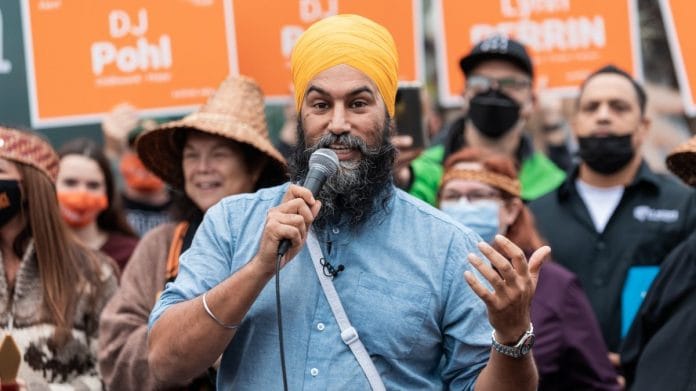New Delhi: Canadian MP Jagmeet Singh, the leader of the New Democratic Party (NDP) and a former ally of Prime Minister Justin Trudeau, has called for more diplomatic sanctions against India and a ban on the Rashtriya Swayamsevak Sangh (RSS) in the aftermath of Ottawa’s decision to “expel” six Indian diplomats over alleged links to violence in Canada.
In a statement, the Indo-Canadian politician said he supported the decision to “expel Indian diplomats” – among them High Commissioner Sanjay Kumar Verma – and called on the Canadian government “yet again to put diplomat sanctions against India in place, ban the Rashtriya Swayamsevak Sangh (RSS) in Canada, and commit to pursuing the most severe consequences for anyone found to have participated in organised criminal activity on Canadian soil”.
Late Monday night, India also expelled six Canadian diplomats in a tit-for-tat move after Ottawa allegedly told New Delhi that the Indian diplomats, including the high commissioner, had been implicated in the 2023 killing of Sikh separatist Hardeep Singh Nijjar.
In his statement, Singh further said his party was worried about information released by the national police, the Royal Canadian Mounted Police (RCMP). “Since September 2023, at least 13 people have been warned by the RCMP of grave threats against them. The safety of Canadians has not been secured yet,” said the MP, who is the first Sikh to lead a major federal party in Canada.
The NDP leader said Canadians, particularly the Sikh community in Canada, “have been stalked by fear, threats, harassment and violence—including extortion, violence, and electoral interference—all allegedly at the hands of Indian officials”.
The MP from Burnaby South, whose NDP helped prop up Trudeau’s Liberal Party government in 2022, further alleged: “Canada has long held credible evidence that the Narendra Modi government was involved in the murder of Canadian Hardeep Singh Nijjar on Canadian soil… yet NDP had to fight just to have potential subversive activity by India included in the scope of inquiry into foreign interferences.”
In September, the NDP terminated an agreement with Trudeau that helped keep his minority government in power, saying the Liberals were “too weak, too selfish” to fight for Canadians.
India, meanwhile, has rejected Canada’s allegations as “preposterous” and linked them to “vote bank politics”.
Ties at all-time low
Relations between the two countries began their downward spiral in September 2023, when Prime Minister Justin Trudeau alleged that Canada had credible evidence linking Indian officials to the murder of Nijjar just months before.
In June that year, the India-designated terrorist and Canadian citizen was shot dead in the parking lot of a gurdwara in Surrey, British Columbia, by two masked gunmen.
India has vehemently denied the allegations and accused Ottawa of “smearing India for political gains”, failing to provide it with concrete evidence to back the accusations, and turning a blind eye to anti-India extremism in the country.
On Monday, the Ministry of External Affairs (MEA) summoned Canadian Chargé d’Affaires Stewart Wheeler and told him the targeting of Indian diplomats was “unacceptable”.
This was followed by the expulsion of six Canadian diplomats, including Wheeler as the acting high commissioner. The MEA has given them till 19 October to leave India.
At the same time, the MEA announced the withdrawal of six diplomats, among them High Commissioner Verma.
However, at a press conference hours later, Canadian Foreign Minister Mélanie Joly said the Indian diplomats had been expelled before India withdrew them. Trudeau, in a statement to the press, alleged that the Indian diplomats had been carrying out “clandestine information gathering”.
At yet another press conference Monday, RCMP Commissioner Michael Duheme alleged that there have been “over a dozen credible and imminent threats to life” where it had to warn members of the “South Asian community, and specifically members of the pro-Khalistan movement”.
The national police said they had evidence to demonstrate four serious issues: “violent extremism impacting both countries; links tying agents of the Government of India (GOI) to homicides and violent acts; the use of organised crime to create a perception of an unsafe environment targeting the South Asian Community in Canada; and interference into democratic processes.”
The escalation comes even as India is working with the United States in an investigation into an alleged plot to murder another India-designated terrorist—Sikhs for Justice (SFJ) founder Gurpatwant Singh Pannun. In November last year, US prosecutors charged Indian national Nikhil Gupta with attempting to assassinate Pannun in New York. According to a federal indictment, Gupta was directed to do so by an agent of India’s spy agency.
(Edited by Tikli Basu)
Also read: Canada says all actions including diplomatic sanctions on table, gives no evidence on Nijjar killing






